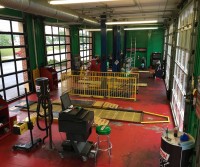
A vehicle tune-up is an important part of your car servicing. Besides your regular oil changes, performing routine maintenance can help extend the life of your vehicle. It can also help reduce the cost of future repairs.
You can check your vehicle’s owner’s manual to find out the recommended tune-up schedule for you. Newer vehicles can go from 25,000 miles to as many as 100,000 miles without needing a major tune-up.
Does My Car Need a Tune-Up?
Being proactive with your vehicle can help fix a minor problem before something major happens. A tune-up makes sure your vehicle functions properly and helps prevent future damage.
If you haven’t had a tune-up in a while, becoming familiar with common warning signs can save your time and frustration. Consider these common indicators that something wrong might be going on under the hood of your vehicle.
Vibrations or shaking
Noticing a shaking sensation in your steering wheel while you’re starting your vehicle, steering, or braking? This could be a sign of a number of different issues; from bad brakes and routers to your power steering. These types of problems are best to get it checked out by the professionals!
Rough shifting
Your vehicle’s automatic transmission handles how your vehicle’s gears-shift. Is your vehicle’s transmissions shifting hard, jerking, or shaking during a shift change? If it is, your vehicle’s transmission fluid may need to be changed or the fluid level may be too low.
Stalling
There are three primary causes of your vehicle stalling: .1 lack of fuel, 2. not receiving enough air or, 3. insufficient power. These can be caused by dirty or fouled spark plugs, water in the fuel, a faulty fuel pump, a bad ignition coil, or a bad sensor. Regardless of what is causing your car to stall, the best way to avoid high repair costs is to get your vehicle checked as early as possible.
Check Engine Light
This is usually a strong indicator that something is not working properly. When check engine light illuminates your dash, your vehicle’s computer stores a “trouble code” in its memory that identifies the source of the problem. When your check engine light comes on, it’s important to bring your vehicle to a professional so that your vehicle can be hooked up and diagnosed by reading warning code from your vehicle’s computer.
Is your car ready for a tune-up, or is your vehicle showing signs of a problem? Did you know that all six of your local Fast Lube Plus location can help you diagnose what is happening under the hood of your vehicle? Stop by today!
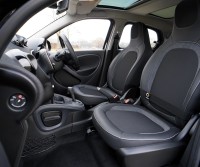
Keeping your vehicle clean has always been an important part of extending the life of your vehicle, but now it’s also important to help keep yourself and your family healthy.
Washing your hands and disinfecting high-touch surfaces are two of the best ways to defend against spreading the coronavirus, according to the Centers for Disease Control and Prevention (CDC).
Common Touch Points
When you begin to clean and sanitize your vehicle, start by working your way from top to bottom, start with the sun visors, then moving down the console, and then to your dashboard. Touchpoints in your vehicle extend further than your door handles and steering wheel.
- Door Handles
- Steering wheel
- Mirrors
- Console buttons
- Seatbelt
- Radio
- Trunk handle
- Children’s seats
- Armrests
How do you safely disinfect the interior of your vehicle without causing damage?
Your vehicle has a collection of various materials, fabrics and surfaces that need to be cleaned. Using cleaners like hand sanitizers and bleach wipes that would most definitely kill viruses, but would also risk damaging the various materials in your vehicle.
According to Jeff Stout, executive director global innovation at Yanfeng Automotive Interiors, nearly every interior surface of a vehicle can be cleaned with isopropyl alcohol (which is the most common and widely used disinfectant within pharmaceutics, hospitals, cleanrooms, and electronics or medical device manufacturing, according to PAC Industries.)
Though the easiest way to fight against germs and the Novel Coronavirus, according to experts is to use soap and water. Most household dish soaps are made with only mild detergents, and “Kill 99.9% of Germs,” and are much less harmful on your car’s interior.
Try To Avoid These Types of Products:
- Ammonia-based cleaners on your vehicle’s touch screens; they can damage their anti-glare and anti-fingerprint coatings.
- Bleach or hydrogen peroxide can ruin your upholstery, remove protective coating and dry out your interior.
Are you looking to have your vehicle professionally cleaned and sanitized? Fast Lube Plus is now providing the True Brand True Clean Touch-Point Service and Touch Point and Misting with Total Sterilization Package.
True Brand ALL-IN-ONE TRUE CLEAN GERMICIDE is a MULTI-SURFACE GERMICIDAL llAY with 70% alcohol formulated to clean and destroy the growth of harmful microbiological organisms on high-traffic touch areas.
Our team will disinfect all high traffic areas such as door handles, door panels, steering wheels, shifter knobs, seat belts and more. Contact us today!
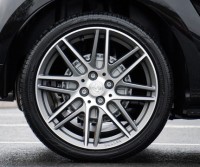
As a car owner, one of the most important steps in prolonging the life of your vehicle is to perform routine maintenance. Following the recommended time frame and schedule in your owner’s manual is a great way to keep your vehicle running at its best, increase its life and save money on repairs!
When there is a problem, sometimes it is tempting to “do it yourself” to save money, but it’s important to leave some, like the ones below, to the professionals.
Tire Rotation
Routinely rotating your tires is one of the easiest ways to prolong their life. Did you know that all of your tires do not wear the same?
While you may think it is an easy task to jack up your vehicle to rotate your tires, it’s a job that needs to be very done accurately by someone with training. When rotating your tires, it’s important to make sure everything is re-balanced and aligned for even wear and tear of your tires’ sidewall and tread. Rotating your tires on your own could put you at risk of driving with an unsafe alignment! This is an inexpensive maintenance item; leave it to the pros.
Check Engine Diagnostics
Check engine lights make it easy to “self diagnose” with newer vehicles. You can go to your local auto store or even download an app to your phone! The problem with using those programs to diagnose your vehicle is that many check engine codes are vague. Instead bring your vehicle into a place like Fast Lube Plus where there is high level equipment to get a more in-depth read of the issue – saving you money in the long run. By letting a professional read and decipher the code, they can use their expertise to help correctly solve your problem!
Keeping Your A/C Cold
The next time you’re in your vehicle and your A/C feels like it’s just not cooling down your vehicle the way it should, you should have a mechanic evaluate what’s wrong with the system before you consider going to your local store to pick up a DIY A/C recharge kit.
While it’s tempting to just spend a few dollars on a recharge kit, you could do MORE damage to you’re A/C. If you’re A/C is low on Freon there is probably a leak. DIY kits can be a quick fix but will not fix the underlying problem. They can also overcharge the system and cause more issues to the valves and seals inside the A/C’s compressor, causing them to crack from the pressure.
If you need to get your A/C under control leave the job to the professionals at Fast Lube Plus!
***
Saving money by doing it yourself can work for some fixes on your vehicle, just make sure you do your research, as you may be facing a larger financial cost if you attempt to “fix” the problem on your own. Our team at Fast Lube Plus understand what it takes to repair your vehicle to have it functioning at its best!

Summer is here and that could mean a family road trip is on the calendar! Before you hit the open road, it is important to make sure your vehicle is up for the trip! Make your vehicle maintenance part of your pre-trip preparation.
Change Your Oil
Check your oil level and the date that you last got an oil change. If you’re close to needing new oil, stop by your local Fast Lube Plus for a quick and convenient oil change service.
Ensuring you have enough oil in your vehicle and a fresh filter will help your car perform at its best!
Pack Your Summer Vehicle Emergency Kit
Summer road trips are very popular. While you may have taken all the precautions before your trip, you may still find yourself needing an Emergency Kit if your vehicle breaks down or you get into an accident. It’s important to make sure you have enough supplies for your entire family.
A quick list of items to include in your kit are the following:
A flashlight, antiseptic wipes, Band-Aids, tweezers, iodine, duct tape, small tools (wrench, pliers, scissors), and road flares . You should also consider including items such as sunscreen, blankets, bottled water, and non-perishable snacks.
Items to Have During the COVID-19 Pandemic:
- Hand sanitizer
- Disposable gloves
- A Mask
- Disinfectant wipes
Top Off Your Fluids
While making sure your engine’s oil is very important when performing routine maintenance, it’s also important to make sure your brake fluid, engine coolant, windshield washer fluid, power steering fluid, and water for the radiator are filled to correct levels for safe vehicle operation.
Making sure your vehicle’s fluids are at the appropriate levels will help keep your vehicle running smoothly, as well as keep you and your family safe.
Make sure your AC is running COOL
North Carolina summers can be brutal. Before any long-distance road trips, take a quick test drive to make sure that your vehicle’s AC is blowing strong. If you notice a decrease in your cool air, bring your vehicle into your local Fast Lube Plus to have your AC diagnosed.
Check Your Tires & Brakes
When checking your tires, make sure the vehicle has been idled and the tires are cool. Inspect all four tires for cuts, gouges, and bulges.
You can check your tread by inserting a quarter upside down into the grooves.
When checking the tire pressure go by the number in your vehicle manual- not the number on the tire!
To check your breaks, take a test drive around town. If you feel a vibration when applying the brakes or hear a grinding sound, head over to your local Fast Lube Plus for a brake inspection!
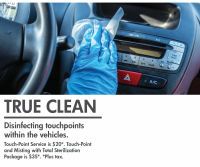
We are happy to announce that Fast Lube Plus is now providing the True Brand True Clean Touch-Point Service and Touch Point and Misting with Total Sterilization Package.
True Brand ALL-IN-ONE TRUE CLEAN GERMICIDE is a MULTI-SURFACE GERMICIDAL llAY with 70% alcohol formulated to clean and destroy the growth of harmful microbiological organisms on high-traffic touch areas. It removes bacteria and
disinfects inanimate objects and surfaces from organisms such as bacteria, viruses fungi while also helping deodorize.
Our team will disinfect all high traffic areas such as door handles, door panels, steering wheels, shifter knobs, seat belts and more. Contact us today!
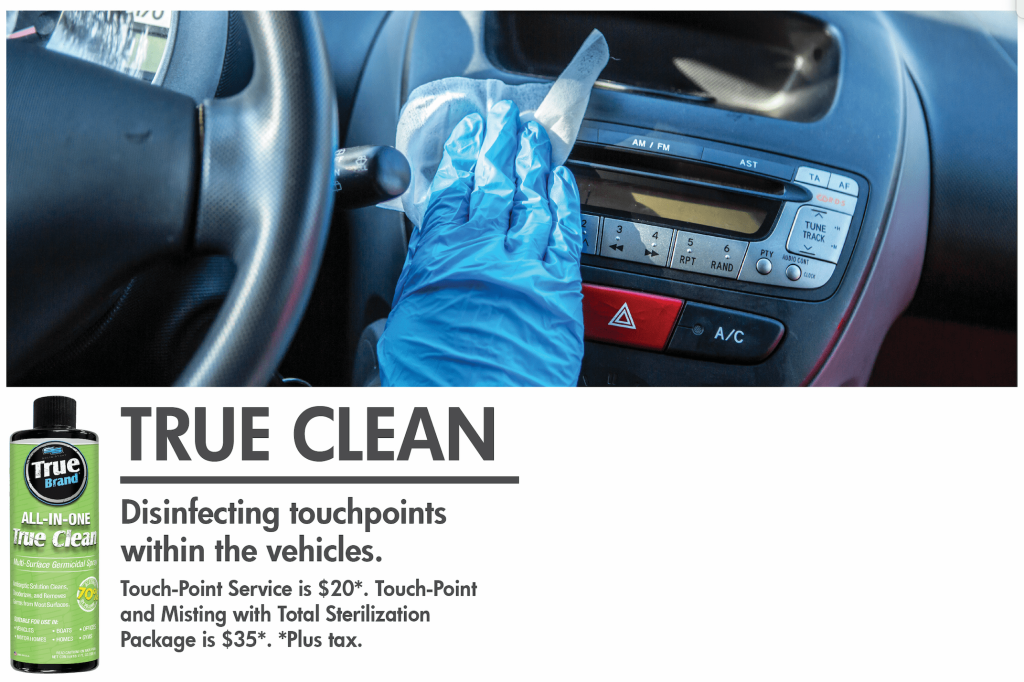
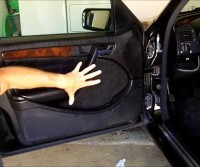
The average American commute is a painful 26.4 minutes long! That means lots of time in your driver’s seat, lots of oily fingers touching the dials, and plenty of dirt and grime from getting in and out.
Knowing that, shouldn’t you properly maintain your car’s interior? It’s easy, affordable, and anyone can do it! Not only does it make that commute more comfortable, but it helps the cabin materials last longer and look great.
Dashboard
Dashboards are typically made from either leather, vinyl, or plastic (or a combination of the three.) Each type of surface requires its own special care, but leather is the most fickle. Your owner’s manual will likely indicate if your dash has a special material.
For vinyl, use mild water and a clean microfiber cloth. While some people prefer the shiny aesthetic of Armor All, the greasy finish is unpleasant and it can crack thinner plastics. If you have to use something stronger than water, consider a diluted all-purpose cleaner or non-greasy Meguiar’s. Be extremely careful cleaning plastics around radios and HVAC controls, as they can scratch easily.
Leather – including seats – requires special care. Get leather cleaner from a trusted brand like Meguiar’s or Mother’s, and follow up with a high quality leather conditioner. As mentioned above, always read your manual for specific pointers!
Carpet and Upholstery
The obvious solution here is to vacuum thoroughly and often. Your corner store’s coin vac works well enough, but personal models offer variable speed control and the ability to spit air out. For vacuuming hard to reach places (especially under seats) it can help to blow debris out before vacuuming it up. You should also invest in a sturdy brush for foot wells and carpet mats. Be gentle, though!
Much as house carpet requires regular shampooing, your car’s upholstery sometimes needs to get wet. While professional detailers have steam machines, you can shampoo yourself with a gentle brush and the proper soap. Just allow plenty of time, because air drying takes a while.
Glass
Good ol’ Windex works wonders on car windows, but you can also use a mixture of water and vinegar. The real key lies in the applicator; use a soft, high quality microfiber towel for the best results. To reduce streaks, make sure you buff properly: firm, in a circular motion.
Does your car need under the hood maintenance? Fast Lube Plus offers oil changes, inspections, and other routine maintenance to drivers in Cary, Holly Springs, Fuquay-Varina, Apex, Morrisville, Garner and the greater Raleigh-Durham area. Contact us today and let’s keep your car running great!
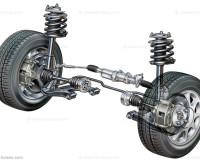
There’s a lot of talk about your car’s tires, and rightfully so. But that rubber is guided towards the road by a complicated assortment of joints, bolts, and metal pieces. It’s what keeps your car comfortable on the highway and on twisty mountain roads: your suspension.
As one of the most hidden parts of your car, suspension maintenance is easy to ignore. It’s also one of the hardest worked. Suspension maintenance isn’t as frequent as other parts, but it still pays to stay on top of it! Here are some parts of your suspension you should know about.
Axles and CV Joints
Own a front wheel drive car? Unless you have a truck or a sports car, you likely do. All front-wheel drive cars use a CV joint (sometimes called a CV axle) to transfer power from the transmission to the wheels. The unique layout of front-wheel drive cars requires a specialized axle with a very flexible joint system, covered by a rubber boot. Over time this rubber boot can crack, removing the joint’s lubrication. Not a good thing to happen while you’re driving!
Control Arms
Your wheel is connected to your car’s frame by a forked metal part called a control arm. As your wheel bounces across the road, the control arm rapidly moves up and down to compensate for the motion. Most control arms are long-lasting, and aside from excessive salt will last a long time. The weaknesses are the rubber and metal bushings that facilitate that motion; have your mechanic check them for wear and tear.
Shocks
Shock absorbers live up to their name: they smooth the motion between your wheels and the body of your car, making bounces more graceful. But when they break, it’s more than an issue of comfort! Bad shocks cause premature tire wear, which gets expensive fast. They can also cause your car to sag, damaging your undercarriage during bumps.
Ball Joints
Your steering system’s final step is at your ball joints, small metal joints that allow steering knuckles to turn your wheels. When they break, you can lose control of your car! Signs of wear include a cracking or groaning sound when you turn the wheel. If you start hearing those noises, you need to have your ball joints checked as soon as possible.
***
Fast Lube Plus offers professional automotive guidance to residents of Cary, Fuquay-Varina, Holly Springs, Apex and Morrisville. Call us now or drop by one of our locations, and let’s get you back on the road!

Down the road when that new car smell fades away and it doesn’t quite drive like it used to, you’ll want to know the extent of your auto warranty coverage. Knowing what parts, tune-ups and repairs will be covered — and for how long — will give you a complete picture of how to minimize your costs and what kind of insurance you’ll need in the long run. Here’s what you need to know to save you money and get the best service for your car when you need it.
Auto warranty 101
An auto warranty is a promise made by a manufacturer or dealer to cover repairs and defects over the course of a certain amount of time and certain amount of mileage. Most basic warranties are guaranteed for at least three years or 36,000 miles, but may vary according to the manufacturer.
Warranties are essential a legally binding pledge to fix or replace any parts that have broken down or are inherently faulty, including defective parts. Warranties do not cover regular maintenance and will not cover breakdowns caused by accidents, acts of nature, lack of proper maintenance, contamination of fluids or fuels, collision, fire, theft, negligence or abuse.
There’s a basic checklist of questions all consumers should have answered before purchasing a car warranty, according to the Federal Trade Commission, including length of the warranty, the point of contact for service, what parts and repair problems are covered, as well as any conditions or limitations on the warranty.
What’s covered?
Different levels of warranty coverage exist, so it’s important to understand the limits and umbrella of coverage before purchasing. These are the most typical types of warranty your car dealer will offer:
Basic “bumper-to-bumper” warranty: This is the most general coverage that pays to repair defects in factory-installed parts.
Drivetrain/Powertrain warranty: Covers the engine, transmission and transaxle parts. This warranty tends to last longer than bumper-to-bumper.
Roadside assistance: Covers towing costs and tire changing if the car breaks down during travel.
Rust or corrosion warranty: Covers rust in sheet metal parts of the car.
Federal emission warranty: Covers repairs needed to correct defects in parts that would cause the car not to meet Environmental Protection Agency standards.
How drivers can maintain their warranty
Regular car maintenance and inspections are necessary to guarantee that a warranty won’t be voided. Typically, routine maintenance includes oil changes, tire rotations, fluid checks and flushes, brake pads, belt replacement, etc. A warranty will remain valid no matter who performs the repairs, meaning you can use your own mechanic or shop — not just the dealer’s service department.
What does auto insurance do that car warranties don’t?
Under car warranties, the manufacturer makes a guarantee to the car buyer regarding the condition of its product. In case car parts do not function as intended, a warranty will cover the costs to repair or replace the part, as well as car rentals due to repairs, and potentially corrosion/rust.
Insurance, on the other hand, is an obligation on the part of the insurer to take on financial protection or reimbursement for the risks that are inherent with driving. Every state in the U.S. except for New Hampshire requires drivers to purchase some level of auto insurance to cover accidents, collisions, car rentals and possibly roadside assistance.
Service contracts or “extended warranties”
When a warranty runs out, car owners may choose to purchase a service contract to provide repairs or maintenance. Vehicle manufacturers, auto dealers and independent providers sell the contract separately from a warranty.
Service contracts will not provide benefits until after the initial warranty expires. Rates for these contracts depend on the life of the car — those with fewer miles and past repairs will get a better deal.
These contracts, while often referred to as “extended warranties,” are not actually warranties. Drivers who are interested in purchasing a service contract should practice due diligence to find the most trustworthy source, particularly from third-party companies.
However, since service contracts are optional and car warranties end, it’s most critical for car owners to purchase insurance that will be the most affordable, provide adequate coverage and be the best fit for their specific car.
Best and worst warranties on the market
There are three vehicle brands that standout for providing the best in basic and power train warranties: Hyundai, Mitsubishi and Kia. Each brand offers five years or 60,000 miles new vehicle limited warranties, and 10 years or 100,000 miles powertrain warranties.
Brands like BMW and Cadillac offer four years or 50,000 miles basic warranties and five years or 100,000 miles powertrain warranties. Other big brands such as Chrysler, Chevrolet and GMC all offer three years or 36,000 miles new vehicle limited warranty, and five years or 100,000 miles powertrain limited warranty
The most standard warranties on the market are offered by Honda, Nissan, Toyota, Ford, Mazda and Subaru with three years or 36,000 miles new vehicle limited warranty, and 5 years or 60,000 miles powertrain limited warranty.
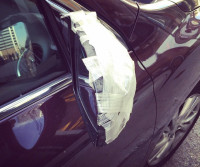
Perhaps you may have thought of resorting to do-it-yourself (DIY) techniques to repair your car, possibly as a way of saving costs incurred for every visit to the repair shop and as a personal challenge to improve your skills in car repair. While DIY techniques may prove to be both useful and enriching, they’re not always applicable to all aspects of car repair. Unless you’re a car technician yourself, you may not have all the time in the world to study all the ins and outs of car repair, which is why some complicated repair matters may not be covered by your DIY skills. To avoid the risk of aggravating your car’s condition, here are some car repair problems that shouldn’t be addressed with DIY techniques.
1: Replacing your worn-out timing belt
Once your car racks up more than 50,000 miles, you may want to have your timing belt checked. Being one of the more crucial wear-and-tear replacements, your engine’s timing belt has to be replaced once it breaks down because your car wouldn’t run properly after that. One thing that has to be considered about your timing belt is that it’s almost always one of the most expensive to repair. With components ranging between $450 and $1,000, you might as well repair your car’s timing belt all by yourself. However, a DIY approach to repairing timing belts is utterly inadvisable.
Several car owners have reported subjecting their cars to more expensive repairs after attempting to fix their timing belts by themselves. With engine damage being the inevitable result of failed DIY approaches to repairing timing belts, it is highly recommended that you don’t deal with your car’s timing belt by yourself. Ask for the services of a skilled car technician for having your timing belt problem addressed – paying between $450 and $1,000 for components plus service charges is definitely more bearable than subjecting your engine to at least $3,500 worth of repairs due to damage caused by DIY approaches.
2: Addressing your automatic transmission problems
If you own an automatic-transmission car, it’s best for you to have your car checked by a car technician one it encounter problems related to its automatic transmission system. Containing several minute components, your car’s automatic transmission system can be very difficult to manage through DIY approaches. Arteries for hydraulic fluid passage and precisely-fitted parts all make up automatic transmissions they can be very complicated to address on your own and it can subject you to very costly consequences once you make a mistake. Therefore, a car technician would best solve your car’s automatic transmission issues, given that they specialize in dealing with its ins and outs.
Your car’s automatic transmission system would most likely lead you to more repair costs if you deal with it improperly using DIY approaches. More often than not, maintaining your car’s automatic transmission system on your own may inadvertently lead to more damage owing to its sheer sensitivity. Thus, even seeming-simple maintenance procedures such as fluid change and flushing should be left to the care of specialized car technicians – their expert services ensures you of less costs and greater success, relieving you from the possibility of exposing yourself to greater costs by going DIY.
3: Dealing with overheating
Overheating is every car owner’s bane, not least because it emerges as a symptom of their car’s overuse. Dealing with the root cause of overheating through DIY approaches is a big no-no unless you’ve received ample training for dealing with cooling systems. Be that as it may, the fact that cooling systems repair is among the most advanced repair issues in cars leaves you with the services of a skilled car technician as the most cost-effective choice for resolving overheating. Otherwise, your DIY attempts to fix your car’s overheating problem would only lead you to suffer massive financial consequences.
4: Dabbling with the cause of your car’s faulty drivability
At some point, your car will definitely start exhibiting problems relating to drivability – failure to start properly, stalling and surging, and notifications telling you to check your engine are just some of the examples involved. Needless to say, those are the kinds of problems that can’t simply be solved by DIY techniques – they require a specialized form of training even skilled car technicians have struggled to perfect. With that, drivability problems shouldn’t be part of your DIY coverage – they are best left to the care of repair shops where car technicians have ample experience dealing with those issues.
Another thing most DIY connoisseurs have failed to understand is the fact that drivability problems require several pages of diagnostics to understand and resolve. Those diagnostics typically require further tests as well, given that codes pertaining to damage in drivability tend to involve other components as well. It is in that regard where DIY approaches have failed to address faulty drivability – just because the diagnostics mention specific codes doesn’t exactly mean that the problem is exclusive to the components mentioned. For that, your car’s drivability problems must undergo a series of repair sessions conducted by car technicians – that’s way more convenient and practical than solving the problem on your own and causing further damage in the process.
5: Solving your suspension woes
Your car’s suspension system may look very easy to deal with from the onset, but the reality is that it’s very difficult to deal with its complexities without proper training. That alone should serve as a warning against employing DIY techniques on solving suspension problems. There have been many instances already where DIY attempts to fix suspension have failed miserably, starting with the failure to deal with the massive force involved in putting a compressed coil spring in place. Replacing struts, arms, and bushings also require the specialized skills of car technicians, given the sophisticated order of their arrangement within your car’s suspension system. Considering as well that service charges aren’t too high as to merit amateur DIY approaches, having your car’s suspension system fixed by car technicians is undoubtedly a more cost-effective idea.
Any of our Fast Lube Plus Locations are more than happy to take the reigns to handle these issues. Give us a call to schedule now!
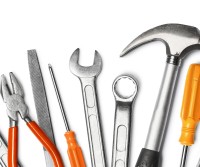
“A man is only as good as his tools.”
Here at Fast Lube Plus we firmly believe that preventative maintenance is the key to keeping your vehicle running at peak performance, but we also are realistic in the fact that sometimes things beyond our control can occur, possibly putting you in a position where a quick fix is necessary. The purpose of this post is to help put together a list of some very useful tools to have around should you ever find yourself stranded.
Having access to a few essential tools can mean the difference between towing to a shop or continuing down the road on your own accord. It should be noted that you should only ever work within your comfort level when having to fix your car in a pinch. So if you are comfortable enough to take the reigns in a pinch, here are a few good suggestions to keep tucked away in your vehicle for the occasion.
- Flashlight – This is perhaps the most essential piece of equipment to keep in your vehicle at all times whether you plan on working on it yourself or not. Always keep a flashlight handy, and test regularly to make sure the batteries are charged.
- Jack / Lug Wrench – Your spare tire is useless without these 2 pieces of equipment. Make sure you know the jackpoints on your vehicle, and a handy trick is to loosen the lugs (in a star pattern) while the tire is still touching the ground.
- Screwdrivers – You cannot do any repair without screwdrivers. It would be wise to keep a couple of these tools with different head shapes and sizes. They are necessary in loosening and tightening the different screws in different parts of your car.
- Vise-Grip Pliers – These lockable pliers are worth their weight in gold. They are most useful as a locking wrench to help loosen / tighten tough bolts or nuts.
- Adjustable Wrench – This handy tool adjusts to fit many sizes of bolts and nuts, and with your Vise-Grip Pliers can help tighten free spinning nuts and bolts.
- Tire Gauge – Used to check the pressure of your tires (including your spare), this should be used monthly to keep tire pressure maintained at the correct levels to prevent unnecessary flats.
Feel free to consult with your Fast Lube Plus technician on your next visit for a demonstration of how to use each of these!
